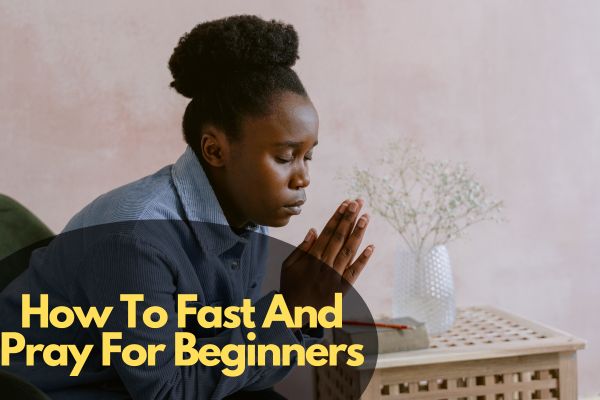Table of Contents Show
A “fast” is a period during which one abstains from eating or drinking anything. For spiritual purposes, individuals of all religions have been fasting for ages. There are specific days and seasons when fasting is appropriate, and Christians have established their methods of fasting.
Spiritual disciplines like fasting and prayer have been practiced for ages in many different religions and cultures. They provide a chance for reflection, spiritual development, and the pursuit of a closer relationship with God. “How to Fast and Pray for Beginners” is an in-depth manual that will give you helpful advice and insights to get started on your spiritual path if you are new to fasting and prayer.
How To Fast And Pray For Beginners
As a beginner, there are a whole lot of things to consider before venturing into fasting and prayer. Let’s get right into it.
1. Know the Goal: It’s critical to know the goal of a fast before starting one. Prayer and fasting can be used for various purposes, such as getting closer to God or seeking guidance, repentance, or spiritual clarity. Making your purpose clear will assist you in maintaining attention during the procedure.
2. Select the Type of Fast: There are various fasts; you can select the one that best suits your physical needs and spiritual aspirations. Common varieties include intermittent fasting (limited eating within specified time frames), partial fasts (restricting some types of food or meals), and water fasts (forgoing all food and only drinking water). As you gain experience, gradually increase the duration or intensity from a manageable start.
3. Prepare both psychologically and physically: It’s important to psychologically and physically prepare yourself before beginning a fast. A few days before the fast, gradually cut back on your use of coffee, processed meals, and sugary drinks. To further help you prepare and establish a clear intention, try praying, practicing meditation, or reading spiritual literature.
4. Keep Yourself Hydrated and Nourished: It’s critical to keep yourself hydrated if you’re on a water fast or other restricted eating regimen. To prevent becoming dehydrated during the day, sip lots of water. In addition, when breaking your fast, go for filling items like fruits and vegetables that are easy on your digestive tract.
5. Create a Prayer Routine: Prayer has a crucial role in the experience of fasting. Allocate a specific time every day for praying and meditating. You can accomplish this in a peaceful, distraction-free environment. Create a prayer practice that you are comfortable with, whether it be saying the standard prayers, expressing your intentions, or just sitting in solitude and connecting with God.
6. Reflect and Keep a Journal: As you go through your journey of fasting and prayer, give yourself some time to consider the lessons you’ve learned. Keep a notebook in which you can record your feelings, ideas, and any insights that come to you throughout this period. By practicing this, you can monitor your development and progress, gain a deeper awareness of who you are, and strengthen your relationship with the divine.
7. Seek Community and Support: While fasting and prayer can be personal journeys, they can be made more enjoyable by connecting with like-minded others and seeking out support. Think about getting involved in group prayers, connecting with like-minded people, or establishing a spiritual community. Sharing experiences, getting assistance, and receiving support from others can be incredibly valuable.
8. Gradually Bring the Fast to an End: Give your body time to acclimate by ending your fast gradually when the time comes. Start with tiny, quickly digested meals or drinks. This will avoid any discomfort or upset stomach that could result from reintroducing larger or heavier meals all of a sudden.
Fasting Tips
-
Steer clear of television
We may be astonished at how much food, particularly ads, is shown on TV. If you do choose to watch TV, keep this in mind. On the other hand, you may use your fast as a chance to also fast from social media, devices, or any form of noise.
-
Pray When You’re Hungry or Weak
You’ll probably experience hunger and/or weakness at some point. Perhaps now is the right time to show support for people who are going without food. It’s also a good moment to reaffirm your dependency on and trust in God. “Dear God, give me the energy beyond my physical state, at this time,” is one way to pray.
-
Take Up Time with Something Else
People are frequently shocked to see how much time they spend cooking, cleaning, and eating. During a fast, all that time becomes open. Choose what you’re going to do with some of your free time before you fast. You could meditate, pray, or read spiritual literature. You may arrange to help out at a pantry or shelter, for example.
Conclusion
Starting a fasting and prayer routine can be a life-changing event that offers a chance for introspection, spiritual development, and a closer relationship with God. By understanding the aim, preparing psychologically and physically, forming a prayer practice, seeking support, and reflecting on your experiences, you can embark on this trip with confidence and intention.
Never forget that prayer and fasting are very private rituals, so feel free to customize them to suit your own needs and views.
FAQs
1. At what times do Christians observe fasts?
Fasting begins at midnight in all churches, and it must be completed before receiving Holy Communion. Every church observes numerous other days and fasts on most Wednesdays and Fridays of the year. In addition, monks and nuns observe extra fast days that are not necessary for laypeople.
2. When fasting, what time should I pray?
Even (and especially) when you feel weak, vulnerable, or agitated, you must commit yourself to seeking God’s face. During what were once mealtimes, read Scripture and pray. At night, when you awaken, meditate on Him. Praise Him anytime you feel like it.
3. How do you pray and fast to get a message from God?
Allocate a dedicated and meaningful time throughout your fast to worship and pray to God. Make a plan in advance so that you can enjoy the Lord in a leisurely and unhurried manner. During this season, a lot of people start by confessing their sins to God and pleading for his pardon.







